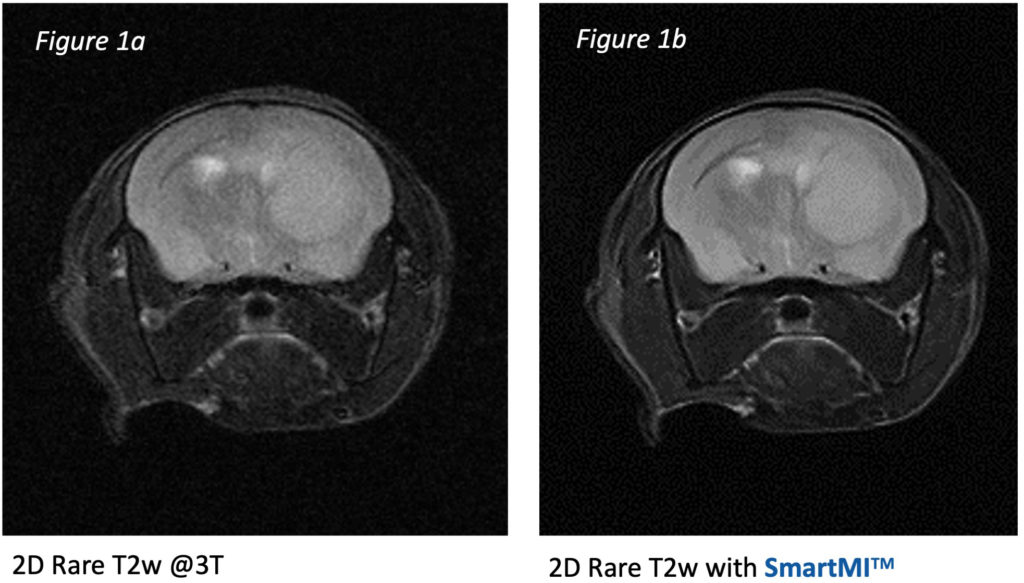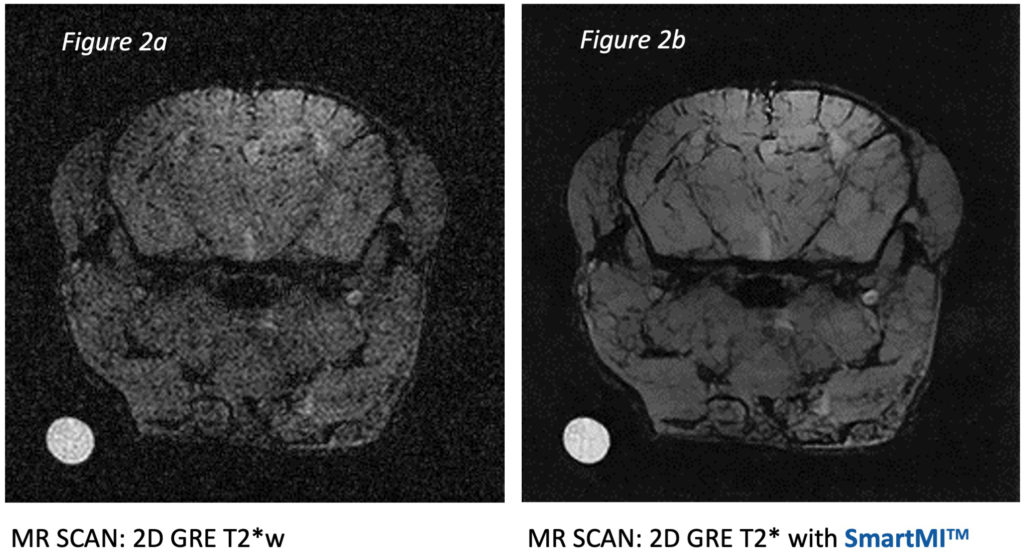New AI revolutionises Magnetic Resonance Imaging (MRI) for preclinical research

The image (figure 1a) on the left shows an MR scan obtained on a mouse brain using a 3T MRI system. By applying SmartMITM (figure 1b) the signal to noise ratio (SNR) on this data set improves by 3.1 times giving the image SNR of a 9.4T scanner.
In MRI (magnetic resonance imaging), image quality of the data is an important factor for a better interpretation of the results. A high signal to noise ratio (SNR) is essential for any scientist who wishes to achieve the maximum resolution and sensitivity.
In preclinical imaging, research institutes are mainly working on small rodents. The size of a subject can be as small as 20 g, and therefore studying complex organs, such as brain can be really challenging if the image resolution is not good enough. Improving the SNR and consequently the resolution is extremely beneficial for all applications. Fiber tracking, functional MRI, arterial spin labelling, all require the highest possible SNR.
To increase the signal to noise ratio it is possible to employ a cryogenically cooled RF coil. The cryogenic coil can increase the SNR typically by a factor of 2 times, but it will be limited to a specific RF coil or a specific subject. In addition, these cryogenic coils are expensive to purchase and expensive to run especially when, as is usual, they use liquid Helium.
Alternatively, one can buy a system with a higher magnetic field strength. However, at very high fields such as 11.7T and 14.0T magnetic susceptibility effects can seriously degrade the image.
To respond to such challenges, MR SOLUTIONS (Guildford, UK) has released its new, cutting edge, machine learning software “SmartMI” for noise reduction and resolution enhancement.
SmartMI, is a game changer in the preclinical imaging industry. A 7T system can now have the SNR of 20.0T system and a 9.4T system even higher. The researcher can then choose to use this enhancement to increase spatial resolution and / or reduce acquisition times.
This is just the beginning of a revolution in the image quality of preclinical MRI. More functionality will be added to SmartMi in the coming months.

The example in figure 2a shows a very low signal to noise image at 7T on a mouse brain using a GRE T2* sequence. The Slice thickness is 0.2 mm / 12 slices with an in-plane resolution 98 x 98 µm2. The low SNR was generated deliberately to demonstrate the performance of SmartMI (figure 2b). SmartMI is capable of extreme SNR recovery. In this case, the SNR gain comparing images in 2a and 2b is a factor of 3.5.
About MR SOLUTIONS:
MR SOLUTIONS GROUP develops and manufactures innovative imaging solutions for research laboratories. The company offers a wide range of products for MR, PET/MR, PET/CT, high resolution CT and SPECT.
The company is the worldwide leader in high-field cryogen-free MR based on its proprietary dry magnet technology. The MRS*DRYMAG product line delivers MR up to 9.4T and a bore size up to 42 cm. Advanced coils and software tools for pulse sequence programming are also available. Helium quench lines and shielded rooms are not required which keeps the installation costs extremely low.
MR Solutions holds the prestigious Queen’s awards 2019, 2017 & 2016, the innovation award from the Institute of Physics and is the winner in the global R&D 100 awards.
MR Solutions has offices and support staff across the world.
+44 1483 906 305
